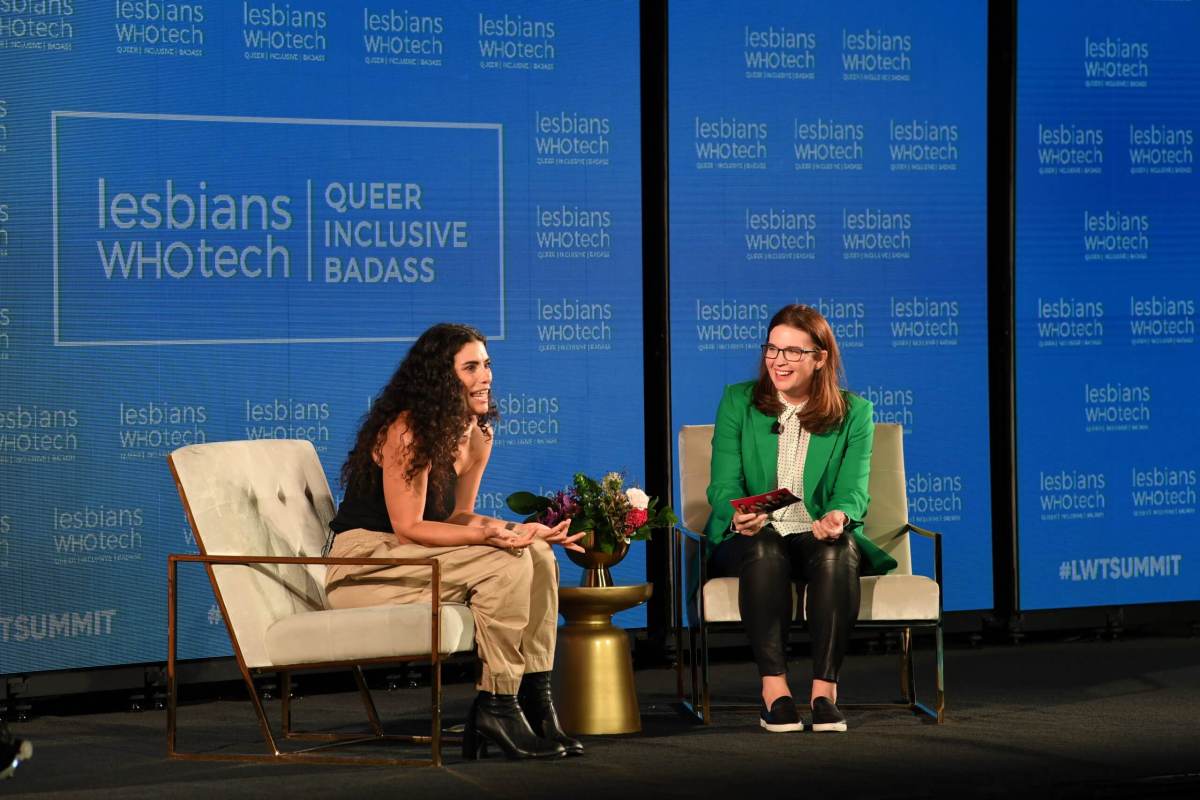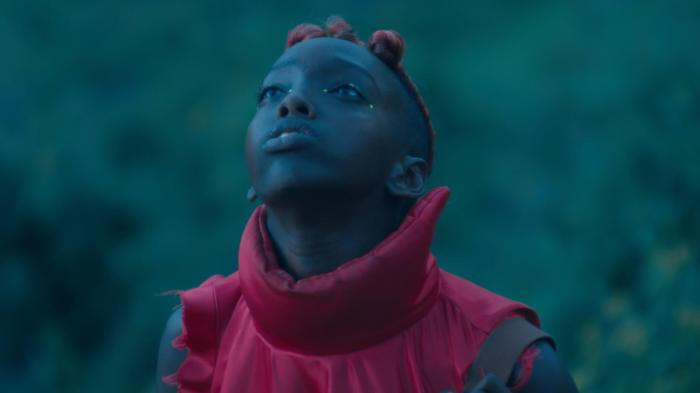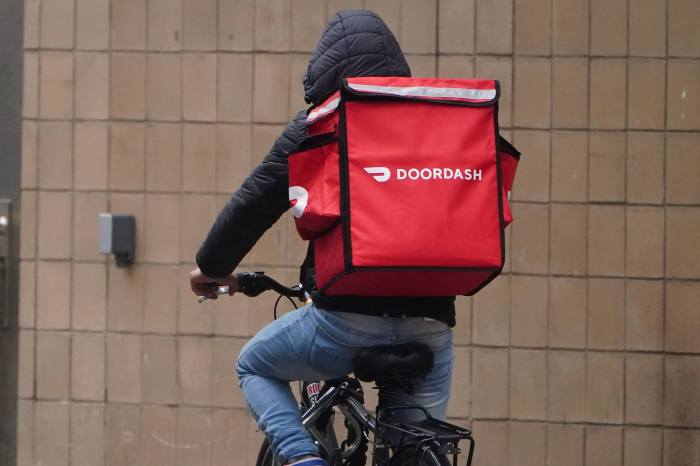The Lesbians Who Tech & Allies Summit (LWT&A) returned to San Francisco’s Castro district in a big way for its first gathering in real life since before the pandemic started.
Gay City News was there for the queer tech event’s 9th annual three-day takeover of the heart of the gayborhood, blocking off Castro Street from Market to 19th streets. An estimated 3,000 queer techies and about 100 technology companies hungry for real-life connections and opportunities descended upon the neighborhood October 12-14. The last live LWT&A event hosted in the Castro was in 2019.
COVID-19-conscious, the conference kicked off virtually with about 12,000 attendees globally October 10-11. The event rolled into its semi-hybrid conference with masked and sanitized techies and online guests listening to speakers on the main stage Wednesday through Friday.
Despite massive layoffs at some of Silicon Valley’s biggest companies in recent months, industry leaders like Airbnb, Cisco, Cruise, Google, Wayfair, Zillow, and others were in search of talent to add to their ranks.
Megan Prichard, the 38-year-old vice president of the ride-hail business unit at Cruise, was recruited by the San Francisco-based company last year following her keynote speech about commercializing autonomous vehicle technology at the 2021 edition of LWT&A.
“Having LGBTQI people in visible leadership roles sends a strong message that all people can bring their talents to Cruise to contribute to our mission while growing their careers,” Prichard wrote. “Cruise is deeply committed to building a truly diverse organization where differences are valued and our employees feel a true sense of belonging and psychological safety. Having a diverse team at Cruise is critical to building better, more robust, and inclusive products.”
She recounted an example of leadership from a transgender team member. She said the employee “helped us to make our account profile creation experience and our in-car experience more inclusive for our transgender and non-binary riders.”
Prichard added, “Independent of our sexuality or gender identity, LGBTQI people are amongst some of the top talent in tech.”
Digital resume-wielding techies were seeking their next big gig — as well as career and life advice — from more than 150 speakers and at 230 workshops, as well as photo ops with industry and other celebrities.
Among those taking the stage included San Francisco Mayor London Breed, Airbnb co-founder and CEO Brian Chesky, Black Futures Lab principal and Black Lives Matter co-founder Alicia Garza, lesbian tech journalist Kara Swisher, Emily’s List president Laphonza Butler, Pixar visual effects supervisor Danielle Feinberg, and many others.
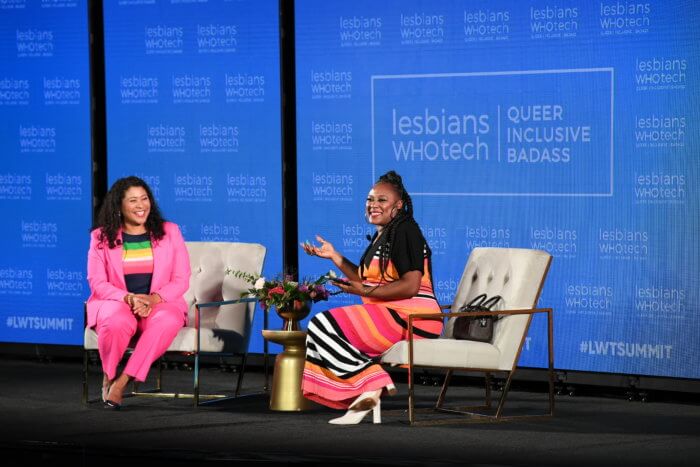
WNBA star Layshia Clarendon showed up to take the stage and get attendees to shoot hoops. DJ Madame Gandhi had the music pumping and people dancing in the street, while queer comedian Cameron Esposito brought the laughs.
LWT&A’s founder and CEO Leanne Pittsford really revved up the crowd during her opening keynote at the Castro Theater October 13.
“It’s been three years and we are finally back in person in the Castro in San Francisco,” Pittsford told the crowd, prompting attendees to roar with applause, whoops, and hollers.
One couple in attendance — Jay Bendett Rose, DEIB manager at Figma, and Emma Schwartz, new product experimentation at Meta — were excited to be at the summit and overwhelmed “in a really amazing way,” Schwartz said.
“It is really nice to be amongst our people,” added Bendett Rose, who uses they/them pronouns. “It’s been a while. It can be exhausting. You get a little bit of social fatigue, but it’s worth it because it also fills up your cup.”
Pittsford recapped the pandemic before quickly turning to LWT&A’s past, present, and future.
Powered up
Pittsford reflected on the organization’s looming 10-year anniversary in 2023.
She got the idea to empower lesbian techies after handling Equality California’s data for five years and working in technology. A common thread that she saw between the LGBTQ nonprofit, headquartered in the Castro and Silicon Valley, was male dominance and the economic gap between them and women, non-binary people, and people of color.
“I could literally track how much men were giving versus women. There’s a big economic difference,” she said, fully aware that women still make less than men. “But it’s really clear when I walked around [the Castro] that if we actually wanted to have an impact, we had to increase our economic power.”
Pittsford said, “There are two ways that you can show up: it’s with your time and it’s with your money.”
“Your money is a lot more scalable because you only got so much time,” she said as she explained LWT&A’s commitment to empowering and investing in diversity. “We have to use economic power and space and we have to make sure everyone around us has more access to economic power.”
Pittsford launched LWT&A in 2012 for queer women and allies to connect and gain opportunities in the male-dominated tech industry. An estimated 800 lesbian techies and their friends attended the first summit hosted at the Castro Theater in 2014.
Standing proudly on the stage, she told the crowd in the nine years the organization has grown to 100,000 LGBTQ women, non-binary people, and allies globally, with communities in 42 cities. The organization’s Edie Windsor Coding Scholarship program helped train more than 400 LGBTQ women and non-binary leaders to learn how to code during the past seven years. She noted that “most of them have jobs in tech today.”
The pandemic era only strengthened the organization. LWT&A quickly pivoted using technology to be there for the community during the darkest days of the pandemic. The organization grew by hosting one of the first virtual conferences in the world, LWT&A Pride Summit, which attracted 30,000 people globally to the free virtual weeklong event. The organization also hosted more than 1,000 virtual classes.
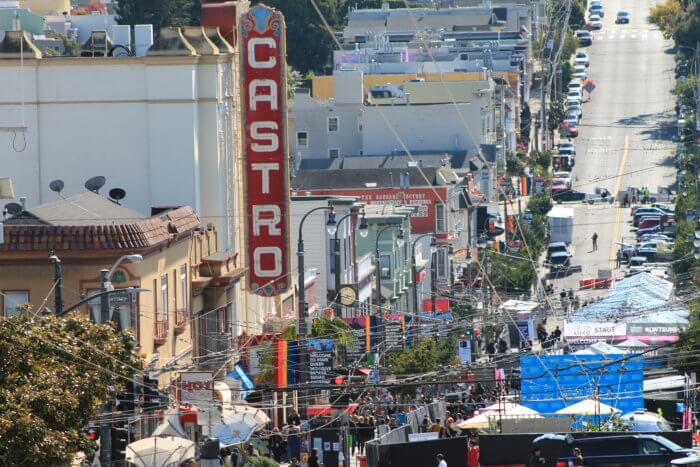
Pittsford’s vision and response to the Supreme Court ruling overturning Roe v. Wade was evident at LWT&A. Throughout the week, queer women of color, non-binary people, politics, self-care, and family all took centerstage at the tech conference as much as artificial intelligence, machine learning, and hot topics like driverless cars and cyber security.
One of the significant changes at the event was free childcare was provided.
Bendett Rose and Schwartz said they were excited to see childcare being offered. The couple has been faithful attendees for many years. The couple is expecting their first child soon. They were concerned about not being able to go to future events.
“It’ll become something that we can continue to come to,” said Schwartz, because childcare is available now.
Looking at LWT&A’s future, Pittsford, who told the audience she had two “COVID-babies” and got a puppy during the pandemic, announced what was to come for the organization in 2023. The Pride Summit will return 100% virtual and free for its fourth year next June, she said. LWT&A will launch a new peer leadership program, Squads, which will connect tech leaders with future leaders for monthly mentorship sessions throughout next year. She also said LWT&A mini summits (some happened this year) will be rolled out to cities across the US next year.
Airbnb, Cisco, and Indeed were major sponsors for LWT&A.

